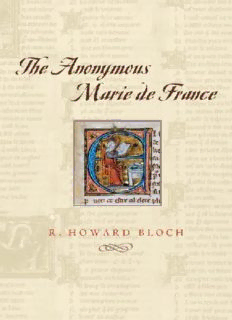
The Anonymous Marie de France PDF
Preview The Anonymous Marie de France
The Anonymous Marie de France The Anonymous Marie de France . (cid:1) The University ofChicago Press / Chicago and London The University ofChicago Press, Chicago The University ofChicago Press, Ltd., London © by The University ofChicago All rights reserved. Published Paperback edition Printed in the United States ofAmerica : ---(cloth) : ---(paperback) This book is published with the assistance ofthe Frederick W. Hilles Publication Fund ofYale University. Library ofCongress Cataloging-in-Publication Data Bloch, R. Howard. The anonymous Marie de France / R. Howard Bloch. p. cm. Includes bibliographical references and index. : --- (alk. paper) . Marie, de France, th cent. — Criticism and interpretation. I. Title. . (cid:1).— oThe paper used in this publication meets the minimum requirements ofthe American National Standard for Information Sciences—Permanence ofPaper for Printed Library Materials, Z.–. , ‒ The joy ofsending this little book into the world is tempered by the sudden death ofmy beloved wife Naomi on December . Ofall the readers I could have imagined she would have been the best, and she still lives as the conjured voice, not silent yet, behind the words. Contents Acknowledgments ix Note on Texts xi Introduction The Word Aventure and the Adventure of Words Aventure Lai History, Philology, and the Quest for Origins The Obligation to Speak The Will to Remember “Guigemar” If Words Could Kill: The Laisand Fatal Speech Marie mal mariée “Lanval” and “Laüstic” “Equitan” and “Le Fresne” “Bisclavret” The Voice in the Tomb of the Lais “Eliduc” “Les Deus Amanz” and “Chaitivel” “Milun” and “Chevrefoil” “Yonec” Beastly Talk: The Fables The Fablesand the Lais Speech Acts in the Fables An Ethics of Language Changing Places: The Fablesand Social Mobility at the Court of Henry II Scholasticism and the Fables Abelardian Ethics Appetite and Envy Logic and the Body Changing Habitat Social Mobility Marie’s Fablesand the Rise of the Monarchic State Right Reason and the Moral Town and Court and Royal Peace Measure, Timing, and Alertness Marie’s Social Contract A Medieval “Best Seller” Chivalric Adventure Doors In and Out of the Otherworld In and Out of Another Tongue Making the Dead Speak Between Fable and Romance Making the Dead See Testimony and Transcription Genesis of the Tale Remembering What the Dead Have Said and Seen The Anglo-Norman Conquest of Ireland and the Colonization of the Afterlife Patrick the Administrator The Norman and Irish Peace Movement Ecclesiastical Reform and the Cistercian Presence The Civil Governance of Captured Land The Invention of Purgatory and the Bureaucratization of the Afterlife Purgatory and the Law Conclusion Notes Index Acknowledgments It is, ofcourse, impossible to thank adequately those who have contributed to this book which has fermented slowly in various academic and archival vats over the course of the last few years. I would like to express my appre- ciation of my students at the University of California, Berkeley, where the section on Marie’s Laiscame into being; my students at Columbia Univer- sity where the section on the Fables was hatched; and my students at Yale University who have been through Purgatory on my account. The parti- cipants in the NEH Seminar on Marie conducted at Columbia in the summer of deserve special praise for pushing me in the direction of a book focused equally on Marie’s three works. Of those with whom dia- logue about Marie has been particularly intense, I express my deep grati- tude to Margaret Pappano ofColumbia, Karen Jambeck ofWestern Con- necticut State, Zrinka Stahulak ofBoston University, and Chantal Marechal of Virginia Commonwealth University and the guardian angel of Marie studies in the United States. Were it not for Scott Hiley’s merciless trimming ofmy prose, the present volume might be less compact than at present. For this he is to be thanked, along with Alan Thomas and Randy Petilos who, again, have made publishing with Chicago a privilege and a treat. Parts ofthis book have appeared in other publications. Portions ofchapter appeared in “The Medieval Text—‘Guigemar’—as a Provocation to the Discipline of Medieval Studies,” Romanic Review (): ‒; re- printed by permission of Romanic Review.Other portions of chapter and portions of chapter appeared in “DasAltfranzösische Lai als Ort von Trauer und Gedächtnis,” in Gedächtnis als Raum,ed. Renate Lachmann and ix
Description: